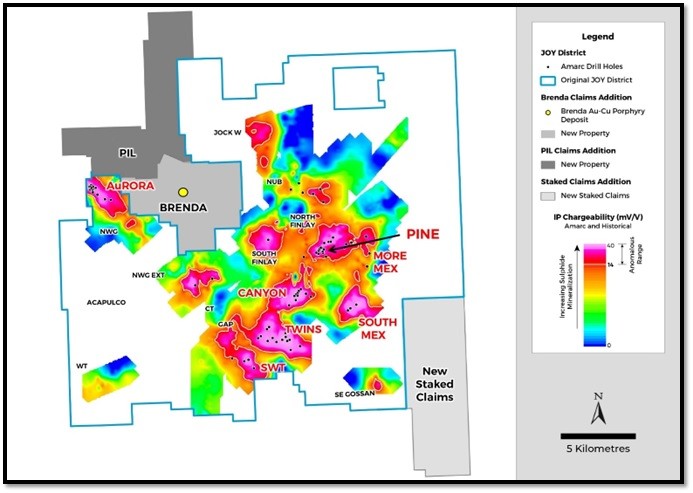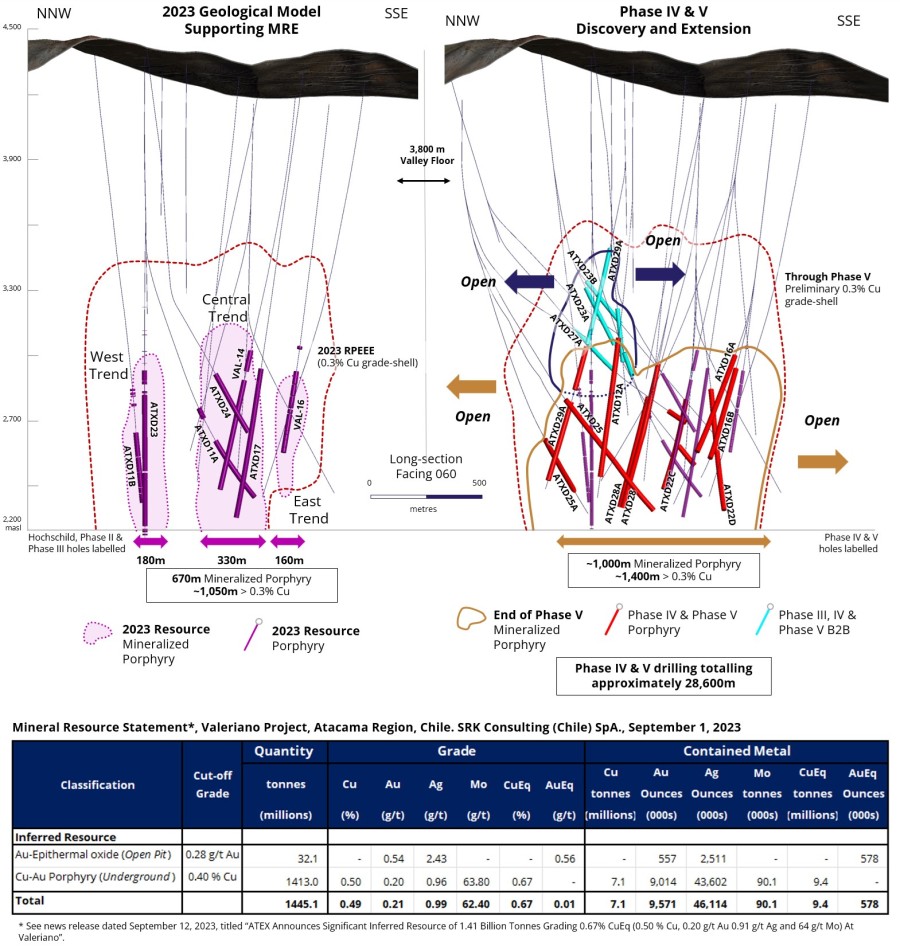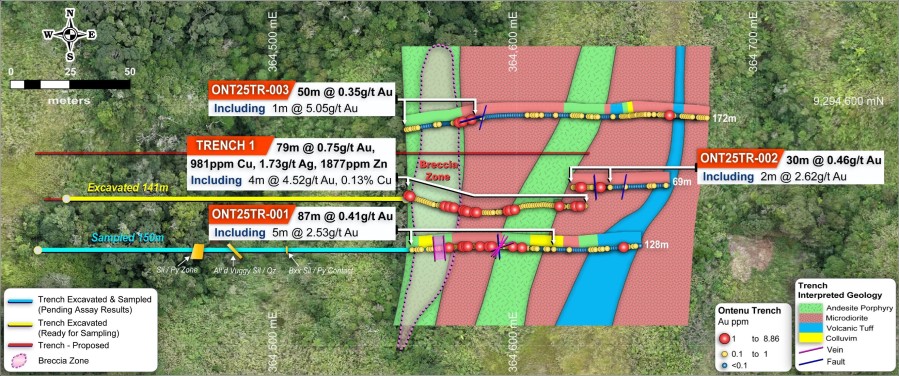VANCOUVER, BC--(Marketwired - February 23, 2017) - Midas Gold Corp. (TSX: MAX) (
Highlights of Recent Assay Results -- Yellow Pine Deposit, Stibnite Gold Project
| Hole-ID | Type | From | To | Width | Au | Ag | Sb | AuEq | ||||||||
| (m) | (m) | (m)(1) | (g/t)(1) | (g/t) | (%) | (g/t)(2) | ||||||||||
| MGI-16-418 | Core | 17.9 | 62.5 | 44.6 | 2.01 | 9.4 | 0.59 | 3.30 | ||||||||
| including | 33.5 | 59.3 | 25.8 | 2.66 | 15.6 | 1.01 | 4.86 | |||||||||
| MGI-16-419 | Core | 54.3 | 72.5 | 18.3 | 2.47 | 16.9 | 1.24 | 5.15 | ||||||||
| MGI-17-421 | Core | 1.52 | 218.2 | 216.7 | 3.24 | 6.1 | 0.30 | 3.91 | ||||||||
| including | 62.5 | 73.2 | 10.7 | 4.66 | 3.7 | 0.01 | 4.72 | |||||||||
| including | 102.1 | 113.1 | 10.9 | 4.40 | 2.5 | 0.00 | 4.44 | |||||||||
| including | 128.3 | 149.7 | 21.3 | 5.67 | 26.7 | 1.32 | 8.64 | |||||||||
| (1) Gold composites are generated using a 0.5 g/t Au cut-off grade. Antimony composites are generated using a 0.1% Sb cut-off grade. Composites may include intervals below cut-off grades. | ||||||||||||||||
| (2) Gold equivalent grades are reported for illustrative purposes only and are calculated using metal prices of $1200/oz Au, $17/oz Ag and $7600/tonne Sb and do not include recovery, transportation, refining or payability. These factors will vary for each metal and affect the economic importance of the various metals. | ||||||||||||||||
| (3) All holes are core holes. | ||||||||||||||||
"The latest assay data from our ongoing drill campaign at Yellow Pine continues to provide positive results that support Midas Gold's goal of enhancing the mineral resource at the Stibnite Gold Project," said Stephen Quin, President & CEO of Midas Gold Corp. "Hole MGI-16-421 is the best hole ever reported by Midas Gold from its drilling at the Stibnite Gold Project and occurs at shallow depths within the limits of the 2014 preliminary feasibility study mineral reserve pit limits." Results from two additional drill holes from 2017 drilling are pending, and one additional drill hole is being drilled before the current campaign is completed for the season.
Central Yellow Pine Area
Hole MGI-17-421 was collared adjacent to the collar of hole MGI-16-414 (the results of which were reported November 30, 2016) and oriented to the southwest to intersect west-northwest to east-west trending, northerly-dipping silica-sulfide vein systems and silica-sulfide breccias at angles appropriate to test their true thickness and to validate legacy drill data from previous operators. These distinctive structural and alteration features, recognized by Midas Gold staff, typically host higher grade gold-antimony (Au-Sb) mineralization in the central areas of the Yellow Pine deposit. Prior drill hole orientations have been focused on optimal orientations for the majority of the gold mineralization but are less than ideal to properly evaluate these important mineralized trends for antimony (and related gold-silver). Hole MGI-17-421 intersected 216.7m averaging 3.24 g/t Au and 0.30% Sb and, along with the previously reported hole MGI-16-414, targeted an area directly below the former historic open pit and underground mining area. The highest-grade portions of hole MGI-17-421 are located between the "A-B" and "C" structures, below where the bulk of historical production occurred and where there was limited modern drilling data. Historical drill data suggested potential for this area to contain significant high grade gold and antimony mineralization and the gold grades in MGI-17-421 were approximately 7% higher than predicted by the PFS block model. Vein arrays and silica-sulfide breccia body orientations, as measured from oriented core, indicate the reported intervals are near true thickness.
Drill hole MGI-17-422, was drilled sub-parallel to MGI-17-421 to a depth of 74m to collect whole core for potential metallurgical comminution testing and will be assayed at a later date.
South Yellow Pine Area
Holes MGI-16-418 and MGI-16-419 were drilled in the southeastern portion of the Yellow Pine deposit to establish continuity of the high-grade silica-sulfide breccia corridor intersected in previous Midas Gold drill holes MGI-12-228, MGI-12-231, MGI-12-337, MGI-12-339, MGI-13-390 and MGI-13-391. The earlier drilling encountered good grades of gold and antimony mineralization within a more tightly constrained zone than were indicated in the legacy exploration drill data. Similarly, MGI-16-418 returned approximately 30% higher gold grades over an approximately 15% longer width, but with slightly lower antimony grades than were anticipated (based on the legacy drilling and PFS block model). The same silica-sulfide breccia corridor was intersected in MGI-16-419 which returned grades twice those anticipated, but over 60% of the expected width. Post-mineralization strike-slip faulting is present in this portion of the deposit and may have cut off mineralization in the drillhole. Geologic interpretations, based on this additional drilling and the use of oriented core are improving the structural interpretations and reducing risk for this key area of the Yellow Pine deposit.
Hangar Flats
Hole MGI-16-420 targeted an area of inferred resources on the east flank of the Hangar Flats deposit. Severe winter weather conditions, deep snow and steep slopes limited access to much of the Hangar Flats area, but this site was accessible and tested. The hole was drilled to test an alternative interpretation targeting mineralization occurring in the hanging wall of a north-easterly splay structure but cut only low grade mineralization averaging 0.24 g/t Au from the collar to hole bottom. Mineralization in this area is now known to occur only within the northerly striking Meadow Creek Fault Zone corridor. Additional drilling planned for Hangar Flats, focused on deeper but higher grade gold-antimony mineralization on the southeast side of the deposit has been deferred due to (a) winter conditions and (b) as drilling was re-prioritized into following up on excellent results from the 2016/17 drilling at Yellow Pine.
Details of the previous news releases, the Project and the 2014 PFS can be found filed under Midas Gold's profile on SEDAR (www.sedar.com) or at www.midasgoldcorp.com.


Sampling Procedures, Quality Control and Quality Assurance
The technical information in this news release has been prepared in accordance with Canadian regulatory requirements set out in National Instrument 43-101 ("NI43-101") and reviewed and approved by Stephen P. Quin, P. Geo., President and CEO of Midas Gold Corp., and a Qualified Person. The exploration activities at the Stibnite Gold Project were carried out under the supervision of Richard Moses, C.P.G., Qualified Person and Field Operations Manager for the Stibnite Gold Project. All gold assays are by a 30g Fire Assay charge followed by an atomic absorption finish (with a 0.005g/t lower reporting limit). Samples reporting values > 6g/t gold are re-analyzed using a 30g Fire Assay charge followed by a gravimetric finish. Silver is analyzed via a 4-acid digestion followed by an ICP finish (with a 0.5g/t lower reporting limit). Samples reporting values > 10g/t silver are reanalyzed using a 50g Fire Assay charge followed by a gravimetric finish. Antimony is analyzed via a 4-Acid digestion with ICP finish with a 5g/t lower reporting limit. Samples reporting values >500g/t antimony are reanalyzed using XRF fusion. Some intervals may not add or subtract correctly due to rounding, but differences are deemed insignificant. Analyses are carried out by ALS Chemex in their Reno and Elko, Nevada and Vancouver, British Columbia laboratories. Umpire samples are routinely submitted to third party labs and blank and standard samples are inserted at appropriate intervals and used for quality assurance and quality control and a review of the results of analyses of the blanks, standards and duplicates by the Company's Qualified Person indicates values are within normal and acceptable ranges.
About Midas Gold and the Stibnite Gold Project
Midas Gold Corp., through its wholly owned subsidiaries are focused on the exploration and, if warranted, site restoration and development of gold-antimony-silver deposits in the Stibnite-Yellow Pine district of central Idaho that are encompassed by its Stibnite Gold Project.
Summary Drill Assay Results -- Yellow Pine (YP) & Hangar Flats (HF) Deposits, Stibnite Gold Project
| Hole-ID | Area | Collar | Collar | TD | From | To | Width | Au | Ag | Sb | AuEq |
| Azimuth | Dip | (m) | (m) | (m) | (m)(1) | (g/t)(1) | (g/t) | (%) | (g/t)(2) | ||
| MGI-16-418 | YP | 270 | -35 | 76.2 | 17.9 | 62.5 | 44.6 | 2.01 | 9.4 | 0.59 | 3.30 |
| including | 33.5 | 59.3 | 25.8 | 2.66 | 15.6 | 1.01 | 4.86 | ||||
| MGI-16-419 | YP | 300 | -35 | 121.3 | 40.1 | 44.5 | 4.5 | 0.67 | 0.5 | 1.82 | 4.27 |
| and | 54.3 | 72.5 | 18.3 | 2.47 | 16.9 | 1.24 | 5.15 | ||||
| and | 84.5 | 100.0 | 15.5 | 1.38 | 0.7 | 0.00 | 1.39 | ||||
| MGI-17-420 | HF | 0 | -90 | 101.6 | Anomalous Au & Sb only | ||||||
| MGI-17-421 | YP | 195 | -28 | 239.6 | 1.52 | 218.2 | 216.7 | 3.24 | 6.1 | 0.30 | 3.91 |
| including | 62.5 | 73.2 | 10.7 | 4.66 | 3.7 | 0.01 | 4.72 | ||||
| including | 102.1 | 113.1 | 10.9 | 4.40 | 2.5 | 0.00 | 4.44 | ||||
| including | 128.3 | 149.7 | 21.3 | 5.67 | 26.7 | 1.32 | 8.64 | ||||
| MGI-17-422 | YP | 199 | -31 | 73.8 | Metallurgical hole, not assayed | ||||||
| (1) Gold composites are generated using a 0.5 g/t Au cut-off grade. Antimony composites are generated using a 0.1% Sb cut-off grade. Composites may include intervals below cut-off grades. | |||||||||||
| (2) Gold equivalent grades are reported for illustrative purposes only and are calculated using metal prices of $1200/oz Au, $17/oz Ag and $7600/tonne Sb and do not include recovery, transportation, refining or payability. These factors will vary for each metal and affect the economic importance of the various metals. | |||||||||||
| (3) All holes are core holes. | |||||||||||





